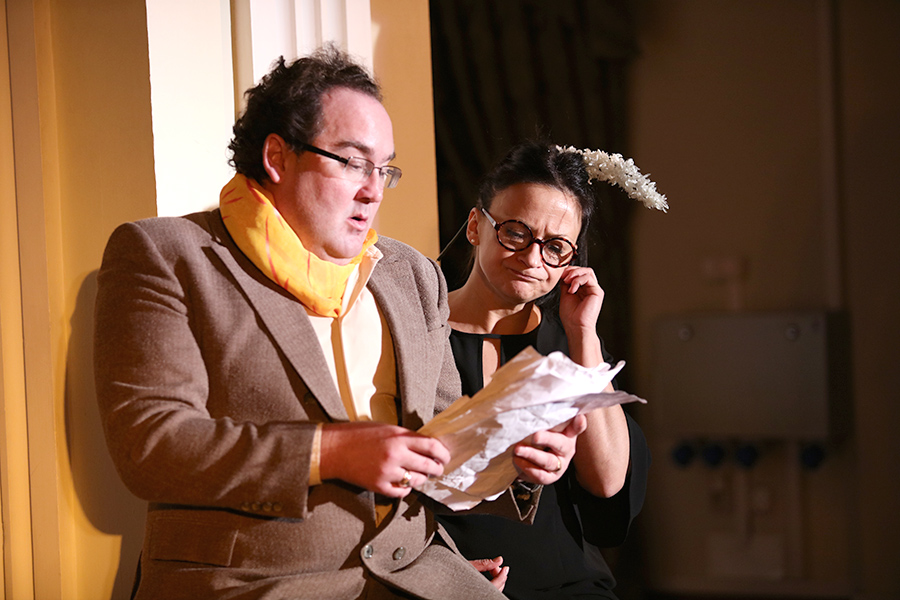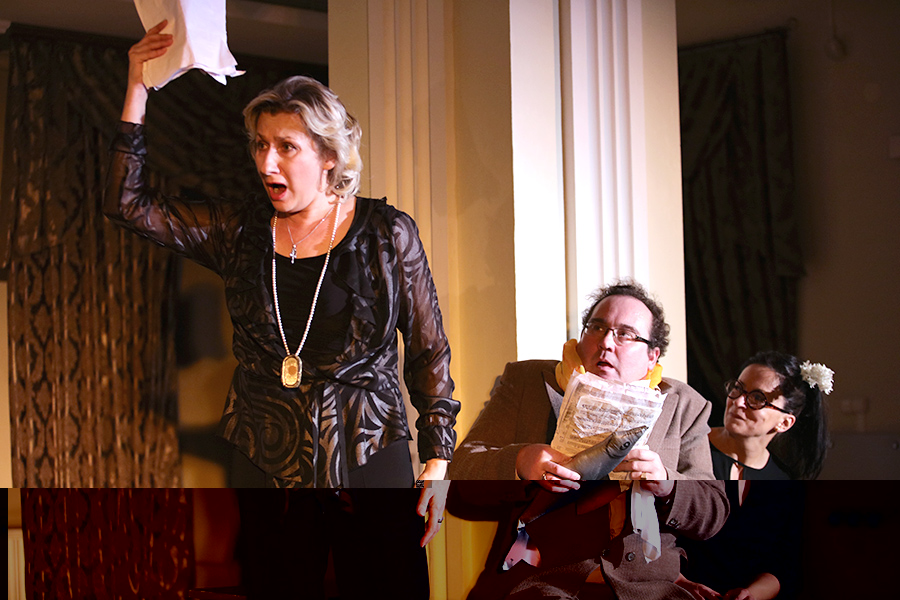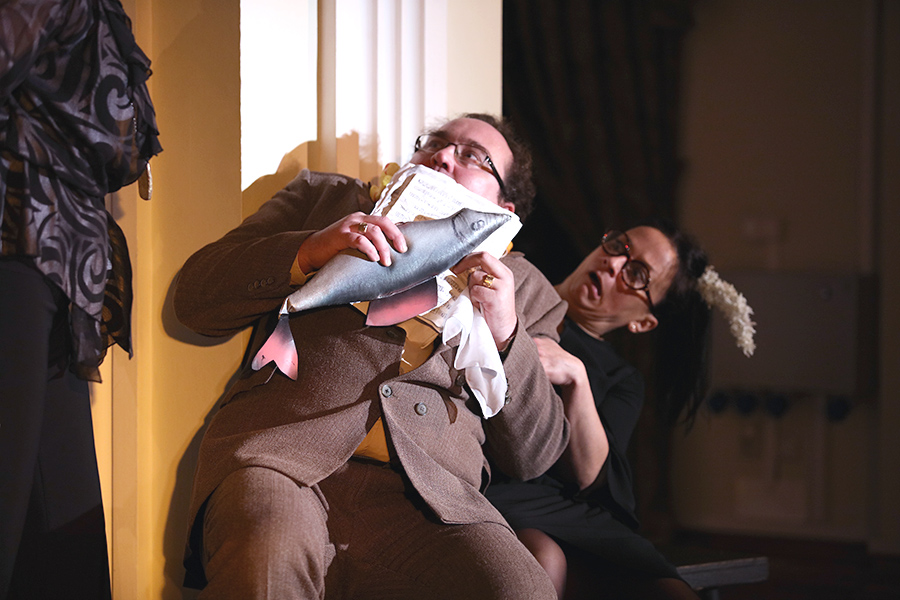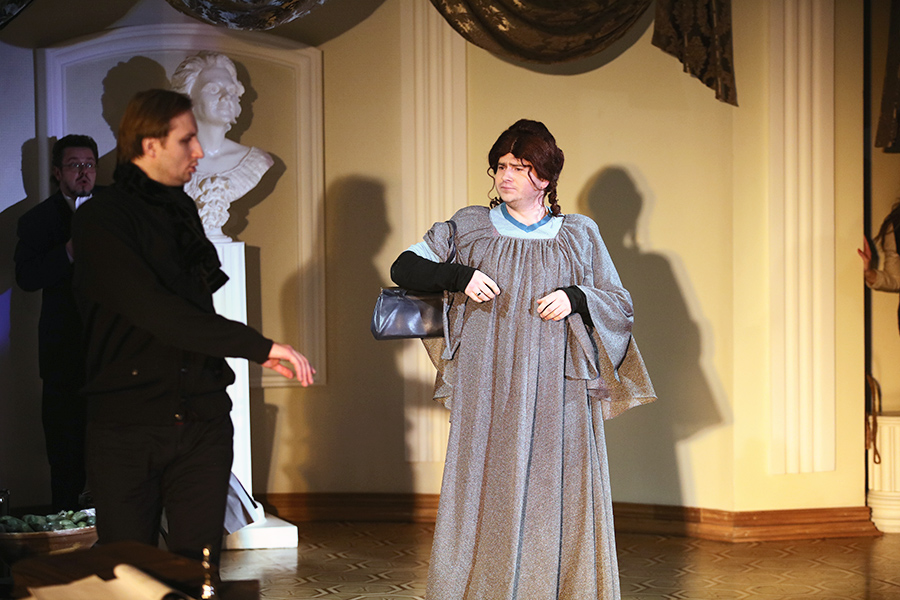 Bolshoi Theatre of Belarus
Bolshoi Theatre of Belarus
Bolshoi Theatre of Belarus
Bolshoi Theatre of Belarus
 Bolshoi Theatre of Belarus
Bolshoi Theatre of Belarus
Bolshoi Theatre of Belarus
Bolshoi Theatre of Belarus
┬Ā
┬Ā
Quarrels and bickering of the artists, intrigue and gossip of the musicians, jokes and pranks ŌĆō a real opera house mess with the main character mother Agatha, whose part is sung by ŌĆ” a man, at the top of it. All this we will find at the Larisa Aleksandrovskaya Chamber Hall on 12 December. Ivan Kostiakhin, the conductor, and Elena Mediakova, the director, are responsible for this outrage. The directors of the premiere of the musical comedy by Gaetano Donizetti Viva la Mamma! Conventions and Inconveniences of the Stage offer a glimpse into the world behind the scenes...
Present time. The troupe is preparing for the premiere of an opera; they are catastrophically short of time and room for practice. Just a few days before the premiere the only suitable room for rehearsal is found, but it is already occupied as a warehouse for props... Unsettled at first, the room is gradually cluttered with scenery, costumes ŌĆō right in front of the audience the opera that is being staged emerges...
Elena Mediakova, ŌĆśI wonder that the first production of this opera by Donizetti had the title Theatre conventions, what was really ironic. Later, having watched the finale, the composer added ŌĆś...and inconveniences". One should agree that there is a struggle of elements, the clash of energies in any creative process. And it is manifested most clearly in the theater environment.
Initially, Donizetti was fascinated by the two pieces for drama theater, so in his musical comedy the composer puts a scene of a provincial theatre on the operatic stage, where its troupe is rehearsing an Italian opera. In the first edition didnŌĆÖt have the happy ending: the troupe could not come to an agreement and the performance never took place. However, Donizetti was so fascinated by this story of theater intrigues that he decided to develop it and wrote the finale where the production finally happened. In general, this is how it really happens in a theatre: everything always comes to an agreement and some kind of solution.
Ivan Kostiakhin, ŌĆśEven the character, who defiantly and with a raw leaves the troupe in the 1st act, returns later. It is because the theater is a shared, collective synthesis of arts and the interaction of energies: conductorŌĆÖs and DirectorŌĆÖs, sopranoŌĆÖs and tenorŌĆÖs,┬Ā soloistsŌĆÖ and orchestraŌĆÖs ... Musicians, artists are employed by a common cause, it is only this cause that they are passionate about, which justifies many of the costs of the profession. Theatre is an opportunity to create new small worlds and give people the joy of plunging into another reality. It is good that we're working on a small scene: we do not put on our buskins but remain down to earth and close to the audience.ŌĆÖ
ŌĆō What language will the opera be performed?
E. M., ŌĆśWe have kept the tradition of the productions of this comedy. The principal musical numbers that relate to relationships in the company and all recitatives are in the language of the country where the performance takes place. In our case it is Russian. But the fragments of the opera which are being prepared by the troupe is sung in Italian. However, one character is an invited tenor who will have a slight accent, after all, he is German.
It is a musical comedy about the behind-the-scenes look at the theatre. Do you think all of the jokes will be transparent to an average viewer?
E. M., ŌĆśIt is a challenge for me as a Director how to open the doors behind the scenes so that the audience will understand all of the jokes, phrases and gestures that are clear to an artist.ŌĆÖ
I.K., ŌĆśBut itŌĆÖs a doable task. If the viewer came, and, moreover, came to listen to an opera, this means that he trusts us, and I am sure that we will be able to convey the meanings of the text ŌĆō external and internal, and emotions of our heroes.
This is comic opera. Not a slapstick, skit, or set of gags. And what is good in this genre is that there may be a hidden irony which is not designed for everyone. Yes, there will be some jokes in that will amuse only musicians or theater-goers. Some will miss the point. But it happens in life! I think every viewer will find of ŌĆśtheir ownŌĆÖ situations, thoughts and jokes in our production.
ŌĆō Have there been any changes to the score by Donizetti?
I. K.: Yes, we afforded some cuts. It turned out an edition for a small group of musicians ŌĆō a versatile instrumental nonet, which includes a string quintet and a brass quartet with a varied, but perfectly sounding voices ensemble. So we have ŌĆśhopeŌĆÖs small little bandŌĆÖ of 9 people. (Smiles.) It was interesting for me to find in the DonizettiŌĆÖs┬Ā score sharpness, swiftness and lightness. I have tried to embody these traits in my edition: to lighten the orchestration for smaller auditorium.┬Ā By the way, the audience will hear and insertion aria from Alcina by H├żndel and we absolutely will not sin against the truth by ŌĆśdilutingŌĆÖ Donizetti with a musical piece of another style. First of all, the performance the fragments of which are being staged by our characters, are written as the old style pasticcios. And secondly, the inserted numbers were quite often used from the musical material by other composers even during the time of Donizetti.
Gaetano Donizetti is said to be one of those composers whose music is the best for voice development of an artist...
I. K., This is the material which really can be medicinal for the soloist, but only if the approach is correct.┬Ā It is difficult to do 10 lifts on a bar after a winter season, but after two or three weeks it becomes real. It is in the same way with the music by Donizetti. For example, some of the artists may have difficulty with pronunciation of fast passages in the recitatives and ensembles. And in the Italian musical comedy you cannot do without them, it is the peculiarity of the style. But after a while, the vocalist copes with them quite well. Something similar happens in singing technology. It turns out that our production is a sort of a vocal resort. (Smiles.)



